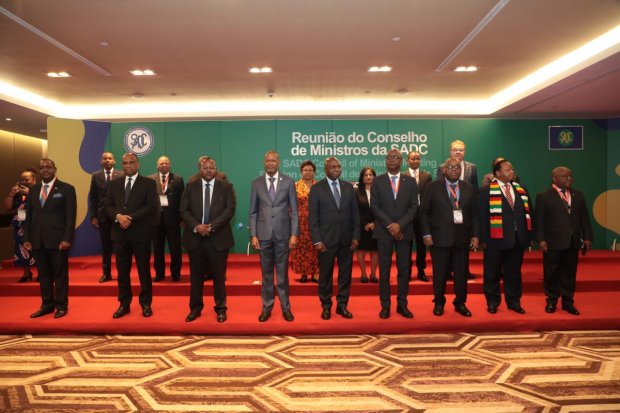Reunião do Conselho de Ministros da Comunidade de Desenvolvimento da África Austral (SADC)
MINISTÉRIO DAS RELAÇÕES EXTERIORES
NOTA DE IMPRENSA
O Ministério das Relações Exteriores alberga desde a manhã deste domingo, 19 de Maio, em Luanda, a Reunião do Conselho de Ministros da Comunidade de Desenvolvimento da África Austral (SADC) que de realiza no formato virtual a partir de Gaborone, República do Botswana.
Esta reunião antecede a Cimeira Extraordinária virtual de Chefes de Estado e de Governo desta organização continental para apreciar a situação humanitária na região, na sequência da seca induzida pelo El Niño, que teve um impacto negativo nas vidas e nos meios de subsistência de cerca de 58 milhões de pessoas.

A Reunião Ministerial da SADC está a ser presidida por Sua Excelência Embaixador Téte António, Ministro das Relações Exteriores da República de Angola e Presidente em Exercício do Conselho de Ministros da Comunidade de Desenvolvimento da África Austral (SADC).
Depois da entoação dos Hinos da República de Angola, da SADC e da União Africana, foram ouvidas intervenções de Suas Excelências Elias M. Magosi, Secretário Executivo da SADC, Martin Griffiths, Subsecretário Geral para os Assuntos Humanitários e Coordenador de Acções de Alívio do OCHA, da Embaixadora Cindy McCain, Directora Executiva do Programa Mundial de Alimentação (PAM), e de Etleva Kadilli, Director Regional para a África Oriental e Austral do UNICEF.
Sua Excelência Embaixador Téte António disse, no seu discurso de abertura, que esta Reunião do Conselho da SADC é uma demonstração da
importância que se atribue à agenda da integração regional e da necessidade de tratar colectivamente e de forma coordenada as questões de importância regional.
Disse também que os desastres não conhecem fronteiras, uma vez que os seus impactos ultrapassam limites nacionais, daí a necessidade da colaboração entre os Estado Membros nas respostas a serem dadas as calamidades naturais.
Esta reunião é uma resposta à directiva de Sua Excelência João Manuel Gonçalves Lourenço, Presidente da República de Angola e Presidente em Exercício da SADC, na sequência da decisão do Conselho de Ministros da SADC, de Agosto de 2023 e das recomendações do Comité Directivo do Programa de Avaliação e Análise da Vulnerabilidade Regional.
GABINETE DE COMUNICAÇÃO INSTITUCIONAL E IMPRENSA DO MINISTÉRIO DAS RELAÇÕES EXTERIORES (GCII-MIREX), em Luanda, aos 19 de Maio de 2024.
Excellencies,
The Southern African Development Community (SADC) countries are currently facing a dire situation as the impact of El Niño wreaks havoc across the region. From droughts in Zimbabwe, Zambia, and Malawi to floods in Tanzania, Mozambique, Madagascar, and the Democratic Republic of Congo (DRC), the region is grappling with multiple crises simultaneously. Compounded by the ongoing challenges of COVID-19 recovery and cholera outbreaks, the severity of this El Niño surpasses that of 2016, making the situation even more urgent and critical. With food reserves depleted and a looming need for imports, the SADC Head of Governments will convene for an El Niño Summit on the 20th of May to coordinate a unified response.
The World Food Programme (WFP) stands ready to provide support to the governments of the region as they address the current emergencies while building longer-term resilience. A coordinated response is crucial at this juncture, involving conducting comprehensive assessments of the affected areas, delivering timely and effective assistance to those in need, providing essential logistics support, mobilizing resources to address the crises, and advocating for the necessary support from various stakeholders.
In my capacity as the WFP Regional Director for Southern Africa, I am calling upon the SADC Ambassadors in Rome to collectively support the El Niño response through active engagement with Rome-based agencies, foundations, the private sector, and other relevant partners based in Italy. Collaborative efforts with these partners can significantly bolster the response efforts and ensure a more effective and coordinated approach to addressing the challenges faced by the SADC countries.
Additionally, the upcoming visit of the WFP Executive Director to Zambia on the 20th underscores the urgency of the situation and the commitment to taking concrete actions to support the governments in their response to the El Niño-induced crises. This visit will serve as a platform to discuss and strategize on the immediate needs and long-term solutions required to mitigate the impact of the disasters and build resilience in the region.
In conclusion, the severity of the current El Niño impacts in the SADC countries necessitates urgent and collaborative action from all stakeholders involved. By working together, pooling resources, and leveraging the expertise and support of various partners, we can make a meaningful difference in addressing the immediate challenges and fostering long-term resilience in the region. Let us stand united in our efforts to support the affected countries and communities, ensuring that they receive the assistance and resources needed to weather the current crises and build a more sustainable and secure future for all.
Menghestab

